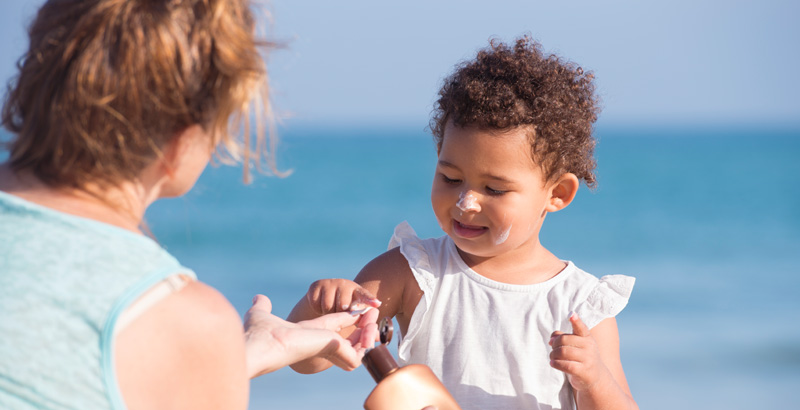Summer Safety

As we approach the end of the school year and get ready to welcome the hot, muggy, hazy and sunny summer months, we begin spending more time outdoors. The fresh air and warm sun invite us to do more outdoor activities with our children. Sun exposure helps the body synthesize vitamin D in the skin. Luckily not much time in the sun is needed to produce adequate amounts of vitamin D to nurture a young body. It is important to remember, that too much sun exposure is also not great for the body. The more time we spend outside the more we are exposing ourselves and our children to the sun’s harmful ultraviolet (UV) rays. In order to avoid sunburns and skin cancer we need to teach our children healthy sun safety habits at an early age.
Sun safety includes seeking shade, using protective clothing and hats, sunglasses and applying sunscreen. It is also important to note that infant skin is different than adult skin. Babies’ skin is much thinner and is less effective in protecting their body against the sun and chemicals in sunscreen can be harmful at such a young age.
When a baby gets a sunburn, it can lead to a medical emergency such as dehydration, high fever, blisters, infections, chills, heatstroke and an increase in their chances of later developing skin cancer. The American Academy of Pediatrics recommends only using sunscreen on children 6 months and older and if necessary, using a minimal amount of sunscreen with at least 15 SPF (sun protection factor) on infants under 6 months to small areas, such as the infant’s face and the back of the hands. The best option for children younger than 6 months is to stay in shaded areas and wear protective clothing. The best sunscreens are those with an SPF (Sun Protection Factor) of at least 30 and containing titanium dioxide or zinc oxide as they are less likely to irritate a baby’s sensitive skin (Skin Cancer Foundation) . It is crucial that all family members, no matter age, take part in using sun safe practices. For children and adults, it is important to make sure we are wearing sunscreen, using hats, wearing protective clothing and sunglasses, while remembering to still take breaks in the shade. This will help to decrease your exposure to the harmful UV rays are limited.
Remember that although sometimes it may seem safer to just stay indoors during hot days of summer, being outside has been proven to improve mental health for everyone. Have fun and remember to stay sun safe all year long!
Best,
Alethea Arguilez
Executive Director
Additional Resources
- Infant and Toddler Health – Expert Answers (The Mayo Clinic)
- Vitamin D and Sun Exposure – (HealthyChildren.org)
- Sun Protection for Kids – (aad.org)
- Sun Safety and Protection – (American Academy of Pediatrics)
- Sun Protection for Children and Infants (Skincancer.org)
